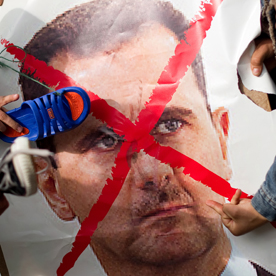EU imposes sanctions on Syrian officials
The European Union imposes travel bans and freezes the assets of 13 Syrian officials, including President Assad’s brother, as part of efforts to end months of deadly violence.

Human rights groups estimate more than 500 people have been killed in Syria since the middle of March.
The anti-government protests started in the southern city of Deraa and have spread across the country.
The European Union has listed 13 Syrian officials under sanctions, including influential businessman Rami Makhlouf.
Makhlouf, a cousin of President Assad, owns Syria’s largest mobile phone company, Syriatel, and several large firms in the construction and oil sectors.
The EU said in its journal that he “bankrolls (President Assad’s) regime, allowing violence against demonstrators”.
Channel 4 News special report: the Arab revolt and Middle East uprisings
The Syrian officials face travel bans and asset freezes. The sanctions also include an arms embargo.
The list includes the President’s brother, Maher al-Assad, who commands Syria’s Republican Guard and is the second most powerful man in Syria.
Also affected is Ali Mamlouk, head of the General Intelligence Service.
UN aid blocked
In other developments, the UN says Syria has not given it permission to access the southern city of Deraa, where Syrian armed forces were deployed to crush anti-government protests.
“The UN humanitarian assessment mission has not been able to get into Deraa,” spokesman Farhan Haq told reporters. “We’re trying to clarify why it hasn’t had access, and we’re also trying to get access to other areas of Syria.”
Asked if the United Nations felt that Syria had reneged on a prior agreement to allow it into Deraa, Haq said: “We’re trying to get the clarification as to why it hasn’t gotten in. Let’s see whether they can get in in the coming days.”
During a telephone conversation with UN Secretary-General Ban Ki-moon last week, Syrian President Bashar al-Assad expressed a “willingness to consider such an assessment to Deraa,” the UN press office said.




